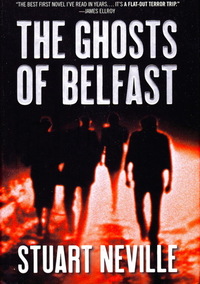You need to sign in or sign up before continuing.
Take a photo of a barcode or cover
I will definitely look for more books by this author. I did not want to put this one down!
Crime fiction isn't my usual fare, but I picked this up after participating in Stuart Neville's microfiction Twitter contest. The premise sounding interesting - unrest in the politics of Ireland and ghosts-that-aren't-ghosts.
This is an action-packed thriller. The plot follows a wide range of characters, which occasionally gets confusing, but it flows together well. The protagonist is Gerry Fegan, who is an ex-terrorist and hired killer. He's being "haunted" by the twelve ghosts of his innocent victims, and there's only one way to make the screaming stop - take out the men that ordered their deaths.
There's a great deal of violence, but I believe that can be expected of the genre. Gerry is a hard MC to get behind due to his actions and past, but it's difficult not to hope he achieves his goal. Stuart does a wonderful job of keeping the reader guessing as to whether Gerry has gone truly mad, or if the shadows that follow him are real.
This is an action-packed thriller. The plot follows a wide range of characters, which occasionally gets confusing, but it flows together well. The protagonist is Gerry Fegan, who is an ex-terrorist and hired killer. He's being "haunted" by the twelve ghosts of his innocent victims, and there's only one way to make the screaming stop - take out the men that ordered their deaths.
There's a great deal of violence, but I believe that can be expected of the genre. Gerry is a hard MC to get behind due to his actions and past, but it's difficult not to hope he achieves his goal. Stuart does a wonderful job of keeping the reader guessing as to whether Gerry has gone truly mad, or if the shadows that follow him are real.
adventurous
dark
emotional
tense
medium-paced
Plot or Character Driven:
A mix
Loveable characters:
Complicated
Flaws of characters a main focus:
Complicated
Some truly gruesome scenes, but definitely a page-turner, and I don't remember reading anything set in Belfast before.
challenging
dark
sad
tense
medium-paced
Plot or Character Driven:
A mix
Strong character development:
Complicated
Loveable characters:
Complicated
Diverse cast of characters:
No
Flaws of characters a main focus:
Yes
Graphic: Animal cruelty, Gun violence, Murder
challenging
dark
emotional
tense
medium-paced
Plot or Character Driven:
Character
Strong character development:
Complicated
Loveable characters:
Complicated
Diverse cast of characters:
No
Flaws of characters a main focus:
Yes
dark
emotional
informative
medium-paced
This was a fun read. Suspenseful, lots of action, but reasonably intelligent too.
A brutal, post-Troubles look at Northern Ireland as the various factions move toward "peace." It's a fascinating reflection on the life of an IRA hit man after his services are no longer needed. Neville is a good writer, and even with the presence of "ghosts," there's never a loss of credibility. This is the first in his Belfast trilogy. I immediately ordered the next two upon finishing this.
This is the third time I have read this book and once again I couldn’t put it down. Fast paced and thrilling.


